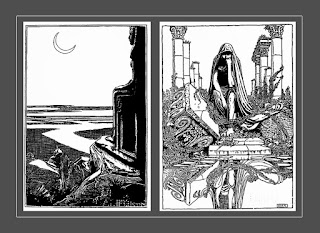The Oedipal construct of Poe’s “Tamerlane”
Edgar Allan Poe, who was abandoned by his biological father and disowned by his adoptive father, ever only once addressed fatherhood in a poem, and it was an Oedipal turn, in his early epic poem, “Tamerlane” (1827). Although the poem, on its surface, is a fictionalized account of the life of a Turkic conqueror known as Timur (1336-1405), Poe knew little about the historical figure and fleshed out much of the detail with autobiographical filler.
The central theme of the poem is the Gothic-Romantic idea that ambition can interrupt romantic love. We see this notion developed in Mary Shelley’s Frankenstein, where Victor’s marriage is sacrificed when his obsession with creating life takes over his energies, and we see this concept starkly presented in the film adaptation The Bride of Dr. Frankenstein (1935), where we see the dueling juxtaposition of the scientist’s “unnatural” dreams against his “wholesome” desires (sexual and otherwise). We see it a little bit, too, in some of Poe’s other poems. For example, in “The Lake” (1827), Poe describes his delight at supernatural terror as “A feeling not the jeweled mine/Could teach or bribe me to define—/Nor Love—although the Love were thine” (emphasis mine).
“Tamerlane” tells the story of a love that came to one who was not schooled in the ways of love—a warrior—and did not know what to make of it:
I have no
words—alas!—to tell
The loveliness of
loving well!
Nor would I now
attempt to trace
The more than beauty
of a face
The words recall the speech in
Shakespeare’s Othello, wherein the title character recalls the unlikely circumstances
by which a hardened warrior finds love by way of a woman’s compassion (“She
gave me for my pains a world of sighs/She swore, in faith, twas strange, 'twas
passing strange/'Twas pitiful, 'twas wondrous pitiful”). Yet, at the end, Tamerlane is a warrior, and
his ambitions lie in the absorbing world of war, his passions drown out
everything else, including this budding love, and he lives to question
lamentingly, as the poem ends:
How was it that
Ambition crept,
Unseen, amid the
revels there,
Till growing bold,
he laughed and leapt
In the tangles of
Love’s very hair?
However, the poem is not addressed
to the scorned lover, as an apology for the neglect, or even as an
introspective reflection on what might have been. Instead, the poem is directed
at Tamerlane’s father, a posture that has been interpreted as a poetic missive
to Poe’s foster father, the great father figure in his life, John Allan, with
whom Poe had a difficult relationship.
In John Allan’s first marriage, Poe was the son his wife could not give
him. But after his first wife died and Allan had children with his second wife,
he invariably wrote the difficult Poe out of his will (Poe had dropped out of
West Point and would pursue a then-unheard of career as a writer).
“Tamerlane” opens with the title
character declaring to his father that the theme of his exposition is not “Kind
solace in a dying hour”—i.e., if you are looking for a rambling trip down
memory lane, forget it, this reflection will be intoned to the tune of Sinatra’s
“I did it my way!” This defiant shot
across the bow is promptly followed up with a downright diss: the narrator notes
that his father is incapable of the “holier—more divine” grace of hope: “I
would not call thee fool, old man,/But such is not a gift of thine.”
Okay? So, unless you really want
to know how Poe felt about being left out of his foster dad’s will, don’t be
asking too many questions because he is not holding anything back.
Nevertheless, that’s not really the point of this exercise, which then pivots
to a more scathing condemnation about how the narrator’s failure is due to his
having inherited his father’s character. I don’t want to make too much of the
word “inheritance,” even though it’s used in the poem, because I don’t believe
the animus is directed at the inheritance issue, but strikes more broadly.
Poe suggests that Allan (or
rather, Poe’s Tamerlane suggests that Tamerlane’s father) had a shrinking character
that led him, perhaps, to easily conform to societal expectations, too quickly
conceding his own passions: “a spirit/Bow’d from its wild pride into shame,”
Poe writes before lamenting, “I did inherit/Thy withering portion with the fame.” Leaving no doubt that he considers his father
a bit of a push-over, a wimp, he posits, “I was ambitious—have you known/The passion,
father? You have not.”
And it is in that context that Poe
tells the story about how, in a blind bid to not be like his father, he
went into ambitious overdrive that killed his best or only chance at love.





Comments
Post a Comment